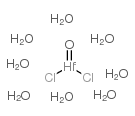14456-34-9
| 中文名 | 八水合氧氯化铪 |
|---|---|
| 英文名 | hafnium dichloride oxide |
| 中文别名 | 二氯氧化铪八水合物 |
| 英文别名 |
EINECS 237-345-3
hafnium dichloride oxide octahydrate,puratronic Hafnium dichloride oxide octahydrate MFCD00150417 hafniumoxychlorideoctahydrate dichlorooxohafniumoctahydrate hafniumchlorideoxideoctahydrate metallicbasis HAFNIUM OXYCHLORIDE,HYDROUS |
| 密度 | 2.2 |
|---|---|
| 熔点 | decomposes [KIR80] |
| 分子式 | Cl2H16HfO9 |
| 分子量 | 409.51800 |
| 精确质量 | 409.96400 |
| PSA | 90.91000 |
| LogP | 0.74580 |
| 外观性状 | 固体 |
| 储存条件 | 常温密闭避光,通风干燥 |
| 稳定性 | 常温常压下稳定 避免的物料:水分/潮湿 碱 。可溶于水。 |
| 分子结构 | 1、摩尔折射率:无可用的 2、摩尔体积(cm3/mol):无可用的 3、等张比容(90.2K):无可用的 4、表面张力(dyne/cm):无可用的 5、介电常数:无可用的 6、极化率(10-24cm3):无可用的 7、单一同位素质量:409.963637 Da 8、标称质量:410 Da 9、平均质量:409.5176 Da |
| 更多 | 1. 性状:无色正方晶系晶体。 2. 密度(g/mL,25/4℃):未确定 3. 相对蒸汽密度(g/mL,空气=1):未确定 4. 熔点(ºC):50 5. 沸点(ºC,常压):未确定 6. 沸点(ºC,5.2kPa):未确定 7. 折射率:未确定 8. 闪点(ºC):未确定 9. 比旋光度(º):未确定 10. 自燃点或引燃温度(ºC):未确定 11. 蒸气压(kPa,25ºC):未确定 12. 饱和蒸气压(kPa,60ºC):未确定 13. 燃烧热(KJ/mol):未确定 14. 临界温度(ºC):未确定 15. 临界压力(KPa):未确定 16. 油水(辛醇/水)分配系数的对数值:未确定 17. 爆炸上限(%,V/V):未确定 18. 爆炸下限(%,V/V):未确定 19. 溶解性:可溶解的 |
|
Section 1: Product Identification Chemical Name:Hafnium (IV) dichloride oxide octahydrate (98+%-Hf, 1.5% Zr) CAS Registry Number:14456-34-9 Formula:HfOCl2.8H2O EINECS Number:none Chemical Family:metal oxyhalide Synonym:Dichlorooxohafnium octahydrate, Hafnium oxychloride octahydrate
Section 2: Composition and Information on Ingredients IngredientCAS NumberPercentACGIH (TWA)OSHA (PEL) Title Compound14456-34-998%0.5mg/m3 (as Hf)0.5mg/m3 (as Hf) zirconium (IV) dichloride oxide 15461-27-52%5mg/m3 (as Zr)5mg/m3 (as Zr) Section 3: Hazards Identification Emergency Overview:Irritating to skin, eyes and respiratory tract. May be harmful if swallowed. Primary Routes of Exposure:Ingestion, inhalation Eye Contact:Causes slight to mild irritation of the eyes Skin Contact:Causes slight to mild irritation of the skin. Inhalation:Do not breath dust. Irritating to the nose, mucous membranes and respiratory tract. Ingestion:No information available on the effects of ingestion. May be harmful if swallowed. Acute Health Affects:Irritating to skin, eyes and respiratory tract. May be harmful if swallowed. Chronic Health Affects:No information available on long-term chronic effects. NTP:No IARC:No OSHA:No SECTION 4: First Aid Measures Immediately flush the eyes with copious amounts of water for at least 10-15 minutes. A victim may need Eye Exposure: assistance in keeping their eye lids open. Get immediate medical attention. Wash the affected area with water. Remove contaminated clothes if necessary. Seek medical assistance if Skin Exposure: irritation persists. Remove the victim to fresh air. Closely monitor the victim for signs of respiratory problems, such as difficulty Inhalation: in breathing, coughing, wheezing, or pain. In such cases seek immediate medical assistance. Seek medical attention immediately. Keep the victim calm. Give the victim water (only if conscious). Induce Ingestion: vomiting only if directed by medical personnel. SECTION 5: Fire Fighting Measures Flash Point:not applicable Autoignition Temperature:none Explosion Limits:none Extinguishing Medium:None. Material is non-flammable. Special Fire Fighting Procedures:No special fire fighting procedures required. Hazardous Combustion andnone Decomposion Products: Unusual Fire or Explosion Hazards: No unusual fire or explosion hazards. SECTION 6: Accidental Release Measures To avoid raising dust, small spills may be mixed with diatomaceous earth, sand, vermiculite or other suitable Spill and Leak Procedures: inert material and swept up. SECTION 7: Handling and Storage Handling and Storage:Store solid in a tightly sealed container. SECTION 8: Exposure Controls and Personal Protection Eye Protection:Always wear approved safety glasses when handling a chemical substance in the laboratory. Skin Protection:Wear protective clothing and gloves. Consult with glove manufacturer to determine the proper type of glove. Ventilation:Material may form a fine dust. If possible, handle the material in an efficient fume hood. If in form of fine dust and ventilation is not available a respirator should be worn. The use of respirators Respirator: requires a Respirator Protection Program to be in compliance with 29 CFR 1910.134. Ventilation:Material may form a fine dust. If possible, handle the material in an efficient fume hood. Additional Protection:No additional protection required. SECTION 9: Physical and Chemical Properties Color and Form:white pwdr. Molecular Weight:265.40 (409.52) Melting Point:no data Boiling Point:no data Vapor Pressure:no data Specific Gravity:no data Odor:none Solubility in Water:soluble SECTION 10: Stability and Reactivity Stability:air and moisture stable Hazardous Polymerization:no hazardous polymerization Conditions to Avoid:none Incompatibility:none Decomposition Products:water, metal oxychloride, metal oxide SECTION 11: Toxicological Information RTECS Data:Intradermal (mouse); TDLo: 800 ug/kg. Carcinogenic Effects:Insufficient data Mutagenic Effects:no data Tetratogenic Effects:no data SECTION 12: Ecological Information Ecological Information:No information available SECTION 13: Disposal Considerations Disposal:Dispose of according to local, state and federal regulations. SECTION 14: Transportation Shipping Name (CFR):Non-hazardous Hazard Class (CFR):NA Additional Hazard Class (CFR):NA Packaging Group (CFR):NA UN ID Number (CFR):NA Shipping Name (IATA):Non-hazardous Hazard Class (IATA):NA Additional Hazard Class (IATA):NA Packaging Group (IATA):NA UN ID Number (IATA):NA SECTION 15: Regulatory Information TSCA:Not listed in the TSCA inventory. SARA (Title 313):Title compound not listed. Second Ingredient:none SECTION 16 - ADDITIONAL INFORMATION N/A |
|
毒理学数据: 1、急性毒性:主要的刺激性影响: 在皮肤上面:在皮肤和粘膜上造成腐蚀性影响,刺激皮肤和粘膜; 在眼睛上面:强烈的腐蚀性影响,刺激的影响;没有已知的敏化影响。 生态学数据: 通常对水体是稍微有害的,不要将未稀释或大量产品接触地下水,水道或污水系统,未经政府许可勿将材料排入周围环境。 CHEMICAL IDENTIFICATION
HEALTH HAZARD DATAACUTE TOXICITY DATA
|
| 危害码 (欧洲) | C |
|---|---|
| 风险声明 (欧洲) | 20/21/22-34 |
| 安全声明 (欧洲) | 26-36/37/39 |
| 危险品运输编码 | UN 3260 |
| 包装等级 | III |
| 危险类别 | 8 |


